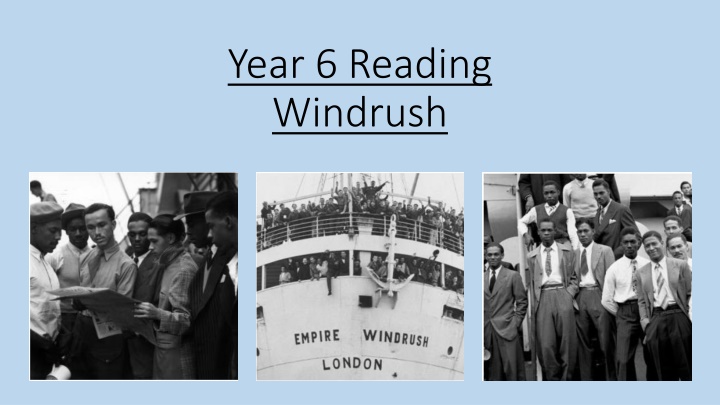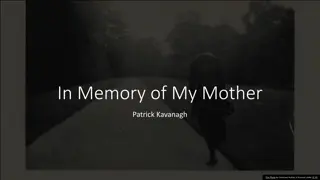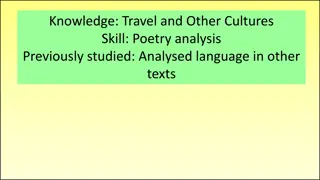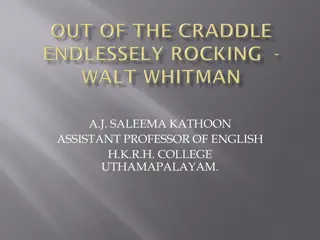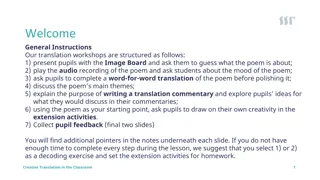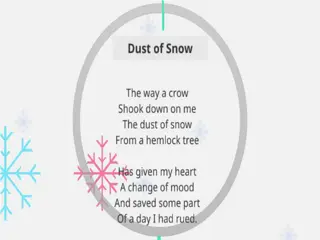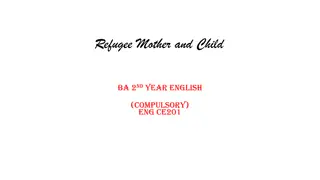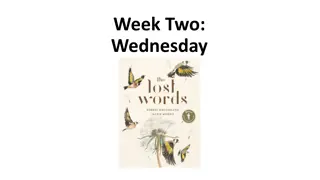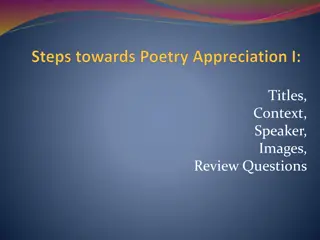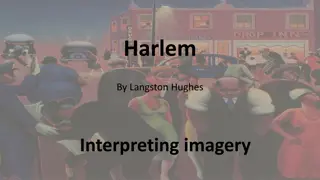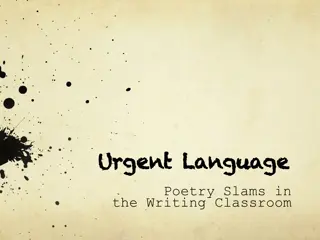The Significance of Windrush Day through "Windrush Child" Poem
Explore the historical impact of Windrush Day through the poem "Windrush Child" by John Agard. Learn about the challenges faced by Caribbean migrants upon their arrival in Britain and the cultural significance of this event. Delve into the themes of identity, resilience, and hope portrayed in the poem as it captures the experiences of the Windrush generation. Discover the legacy and lessons of this pivotal moment in history.
Download Presentation

Please find below an Image/Link to download the presentation.
The content on the website is provided AS IS for your information and personal use only. It may not be sold, licensed, or shared on other websites without obtaining consent from the author.If you encounter any issues during the download, it is possible that the publisher has removed the file from their server.
You are allowed to download the files provided on this website for personal or commercial use, subject to the condition that they are used lawfully. All files are the property of their respective owners.
The content on the website is provided AS IS for your information and personal use only. It may not be sold, licensed, or shared on other websites without obtaining consent from the author.
E N D
Presentation Transcript
Year 6 Reading Windrush
TASK: Your reading task this week is about a poem called Windrush Child by John Agard. Before you start, read through the slides and follow the links to find out more about why Windrush is so significant
Windrush Windrush Day takes place on 22 June, remembering the day when around 500 migrants from the Caribbean arrived at Tilbury Docks in Essex in 1948. Britain was just starting to recover from World War Two back then. Thousands of buildings had been bombed, lots of houses had been destroyed and it all needed to be rebuilt. In the Caribbean, lots of young men and women had served in the British armed forces because at the time, many Caribbean countries were still under British rule and not yet independent. After the war, some of these people answered an advert to come to Britain where there were lots of different jobs to do. Other people just wanted to see Britain, which they had heard so much about. To find out more and to see some videos, click on the link below: https://www.bbc.co.uk/newsround/43793769 Read Mrs Madukah s news story here: https://www.pegasusacademytrust.org/news/windrush-day
What happened when they arrived? When the passengers landed they didn't always get the friendly welcome they had hoped for. Many of them experienced racism and discrimination and often found it hard to get a proper home to live in and to make friends with British people. It wasn't always easy for the new arrivals to get jobs. Some companies said they didn't want black people to work for them. Later, many of their children were bullied at school because of the colour of their skins. Some of them suffered racial attacks and in later years there were riots in cities across Britain.
Windrush Child by John Agard and you Windrush child think of grandmother telling you don't forget to write Behind you Windrush child palm trees wave goodbye and with one last hug walk good walk good and the sea's wheel carries on spinning above you Windrush child seabirds asking why and from that place England you tell her in a letter of your Windrush adventure around you Windrush child blue water rolling by stepping in a big ship not knowing how long the journey or that you're stepping into history beside you Windrush child your Windrush mum and dad bringing your Caribbean eye to another horizon grandmother's words your shining beacon think of storytime yard and mango mornings learning how to fly the kite of your dreams in an English sky and new beginnings doors closing and opening Windrush child walking good walking good in a mind-opening meeting of snow and sun will things turn out right? At least the ship will arrive in midsummer light
Questions 1. In your own words, explain what you think the poem is about. Insert text here 2. Which words or phrases tell you what the Windrush child left behind? Insert text here 3. What sort of place was it? Insert text here 4. Who will the child miss? How do you know? Insert text here
5. Why is the childs grandmother important to her/him? Insert text here 6. 'Windrush child' is repeated four times in the first four verses of the poem. Why do you think the poet chose to do this? Insert text here 7. Can you find another repetition or echo in the poem? Why do you think the poet chose to do this? Insert text here 8. Do you like the poem? Why/why not? Insert text here
Dont forget to send your work to the Year 6 email address: yr6@pegasusacademytrust.org or post your work to your class blog! Thank you!
